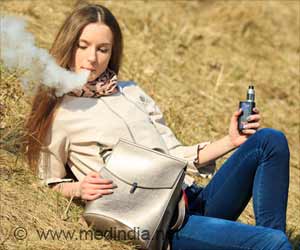UC Riverside research highlights the heightened risk of COVID-19 among e-cigarette users, urging vigilance.

Does vaping increase the likelihood of SARS-CoV-2 infection? Paradoxically yes and no
Go to source). The liquid used in electronic cigarettes, called e-liquid, typically contains nicotine, propylene glycol, vegetable glycerin, and flavor chemicals.
‘Compounds in the e-cigarettes were found to heighten the risk of COVID-19 infection through a complex mechanism. Read on to know more.
#ecigarette #cigaretteuser #covid19
’





The researchers found propylene glycol/vegetable glycerin alone or along with nicotine enhanced Covid-19 infection through different mechanisms. The researchers also found that the addition of benzoic acid to e-liquids prevents the infection caused by propylene glycol, vegetable glycerin, and nicotine.
“Users who vape aerosols produced from propylene glycol/vegetable glycerin alone or e-liquids with a neutral to basic pH are more likely to be infected by the virus, while users who vape aerosols made from e-liquids with benzoic acid — an acidic pH — will have the same viral susceptibility as individuals who do not vape,” said Rattapol Phandthong, a postdoctoral researcher in the Department of Molecular, Cell and Systems Biology and the research paper’s first author.
E-Cigarettes and COVID-19 Link
The researchers obtained airway stem cells from human donors to produce a 3D tissue model of human bronchial epithelium. They then exposed the tissues to JUUL and BLU electronic cigarette aerosols to study the effect on SARS-CoV-2 infection.They found all tissues showed an increase in the amount of ACE2, a host cell receptor for the SARS-CoV-2 virus. Further, TMPRSS2, an enzyme essential for the virus to infect cells, was found to show increased activity in tissues exposed to aerosols with nicotine.
Prue Talbot, a professor of the graduate division and Phandthong’s advisor, said e-cigarette users should be cautious about vaping as some products will increase their susceptibility to SARs-CoV-2 infection.
Advertisement
“If they cannot stop vaping, it is better to vape aerosols produced from an e-liquid with acidic pH or with benzoic acid to prevent the enhanced SARS-CoV-2 infection caused by nicotine, propylene glycol, and vegetable glycerin. However, inhalation of benzoic acid has its own risk, and data is still limited on this topic.”
Advertisement
Did You Know?
Vaping devices can be addictive, especially for young people, and may serve as a gateway to tobacco use.
“Our study only used Classic Tobacco Flavor JUUL e-cigarette and BLU Classic Tobacco e-cigarette. Even with just these two e-cigarettes, we found the aerosols and individual ingredients produced different effects on SARS-CoV-2 infection.”
Phandthong and Talbot hope the Food and Drug Administration will use their findings to implement regulatory laws on e-cigarette products.
“Our findings could also help improve the design of clinical trials involving the use of tobacco products and SARS-CoV-2 infection,” Phandthong said.
“In the meantime, it is worth bearing in mind that the scientific literature has shown that a vaper who contracted SARS-CoV-2 has more complications during the recovery period and is more likely to develop long COVID-19, which can be serious and last many months post-infection. We hope our findings encourage vapers to stop vaping and discourage non-users from starting to vape.”
Phandthong acknowledged the team only investigated the initial stage of SARS-CoV-2 infection.
“There are many later stages involved in infection, such as viral replication,” he said. “It is likely that these additional stages can also be affected by inhalation of e-cigarette aerosols.”
Reference:
- Does vaping increase the likelihood of SARS-CoV-2 infection? Paradoxically yes and no - (https://journals.physiology.org/doi/full/10.1152/ajplung.00300.2022)
Source-Eurekalert















